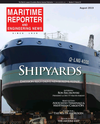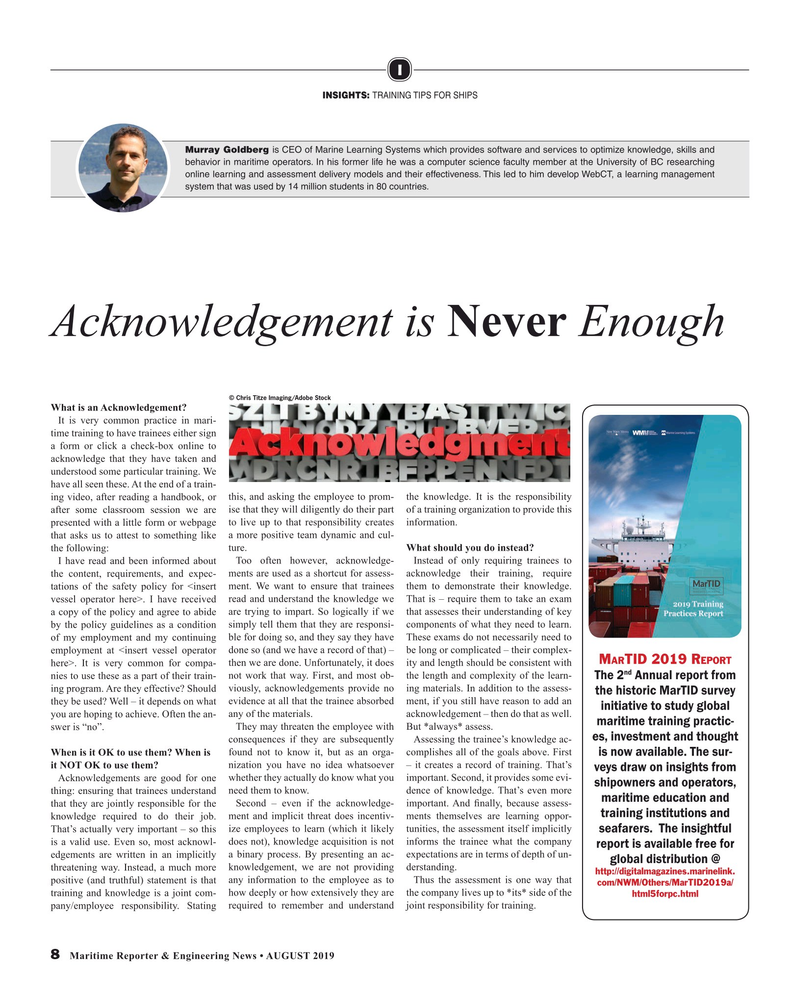
Page 8: of Maritime Reporter Magazine (August 2019)
The Shipyard Edition
Read this page in Pdf, Flash or Html5 edition of August 2019 Maritime Reporter Magazine
I
INSIGHTS: TRAINING TIPS FOR SHIPS
Murray Goldberg is CEO of Marine Learning Systems which provides software and services to optimize knowledge, skills and behavior in maritime operators. In his former life he was a computer science faculty member at the University of BC researching online learning and assessment delivery models and their effectiveness. This led to him develop WebCT, a learning management system that was used by 14 million students in 80 countries.
Acknowledgement is Never Enough © Chris Titze Imaging/Adobe Stock
What is an Acknowledgement?
It is very common practice in mari- time training to have trainees either sign a form or click a check-box online to acknowledge that they have taken and understood some particular training. We have all seen these. At the end of a train- ing video, after reading a handbook, or this, and asking the employee to prom- the knowledge. It is the responsibility after some classroom session we are ise that they will diligently do their part of a training organization to provide this presented with a little form or webpage to live up to that responsibility creates information.
that asks us to attest to something like a more positive team dynamic and cul- the following: ture. What should you do instead?
I have read and been informed about Too often however, acknowledge- Instead of only requiring trainees to the content, requirements, and expec- ments are used as a shortcut for assess- acknowledge their training, require tations of the safety policy for M TID 2019 R AR EPORT here>. It is very common for compa- then we are done. Unfortunately, it does ity and length should be consistent with nd nies to use these as a part of their train- not work that way. First, and most ob- the length and complexity of the learn- The 2 Annual report from ing program. Are they effective? Should viously, acknowledgements provide no ing materials. In addition to the assess- the historic MarTID survey they be used? Well – it depends on what evidence at all that the trainee absorbed ment, if you still have reason to add an initiative to study global you are hoping to achieve. Often the an- any of the materials. acknowledgement – then do that as well. maritime training practic- swer is “no”. They may threaten the employee with But *always* assess. es, investment and thought consequences if they are subsequently Assessing the trainee’s knowledge ac- When is it OK to use them? When is found not to know it, but as an orga- complishes all of the goals above. First is now available. The sur- it NOT OK to use them? nization you have no idea whatsoever – it creates a record of training. That’s veys draw on insights from Acknowledgements are good for one whether they actually do know what you important. Second, it provides some evi- shipowners and operators, thing: ensuring that trainees understand need them to know. dence of knowledge. That’s even more maritime education and that they are jointly responsible for the Second – even if the acknowledge- important. And ? nally, because assess- training institutions and knowledge required to do their job. ment and implicit threat does incentiv- ments themselves are learning oppor- That’s actually very important – so this ize employees to learn (which it likely tunities, the assessment itself implicitly seafarers. The insightful is a valid use. Even so, most acknowl- does not), knowledge acquisition is not informs the trainee what the company report is available free for edgements are written in an implicitly a binary process. By presenting an ac- expectations are in terms of depth of un- global distribution @ threatening way. Instead, a much more knowledgement, we are not providing derstanding. http://digitalmagazines.marinelink. positive (and truthful) statement is that any information to the employee as to Thus the assessment is one way that com/NWM/Others/MarTID2019a/ training and knowledge is a joint com- how deeply or how extensively they are the company lives up to *its* side of the html5forpc.html pany/employee responsibility. Stating required to remember and understand joint responsibility for training. 8 Maritime Reporter & Engineering News • AUGUST 2019 MR #8 (1-9).indd 8 7/29/2019 9:01:52 AM

 7
7

 9
9
